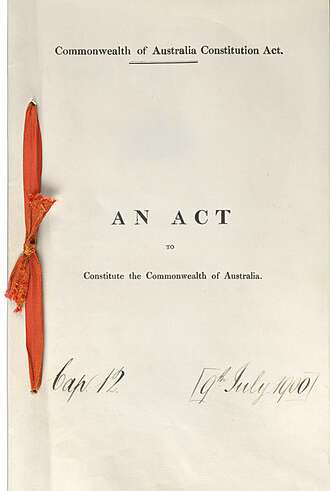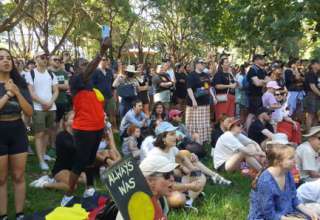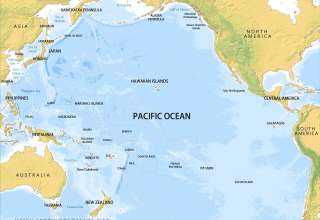By Humphrey McQueen
Canberra, September 29, 2023
Should the Voice be carried, the addition of a mandated power to a piece of paper is no guarantee that a Commission will be set up, or funded. Dutton could ignore ‘Yes.’ Only voices massed beyond the national gasworks would ensure that the Voice does not go the way of the 1967 amendment granting the Commonwealth the power to make laws for the first peoples.
One context for the possibility of inaction is how the Constitution has been changed almost without cease since 1897.
Australian politics turn on the allocation of powers between Canberra and the States. With thirty-nine areas spelt out for the central government in Section 51 of the Constitution, it looks as if every other realm of public activity is reserved for the States. That was the assumption of almost all politicians and voters who approved what they assumed would be the final wording in 1899. In the subsequent 124 years, the pivot has drifted – occasionally wrenched – to the opposite pole.
Referenda have proven an ineffective method of change with only eight of forty-four succeeding. How then has the upending come about?
Whose Constitution?
The Constitution came into effect from January 1, 1901, as an Act of the imperial parliament and remained so until its ‘repatriation’ in 1986 by Joint Acts in Canberra and at Westminster. Before then, London could have amended or over-ruled any or all of it. During the First Great Slaughter, erstwhile premier of Victoria, Sir William Hill ‘Iceberg’ Irvine, called for an Imperial Decree to impose conscription for service overseas. Experience with the North Americans had taught Whitehall not to be seen to interpose itself between colonials and our frolics, relying instead on back-door methods.
Following the money
Throughout the 1880s, Australia had attracted a fifth of the new issues on the London financial market. Bank failures in Victoria and Queensland kept British investors anxious about their treasure.
The Colonial Office worried that loans would not be secure if suits for their recovery were finalised in the High Court of Australia, as proposed in Section 74. ‘Is it likely,’ a high official wrote, ‘that the House of Commons where such capital is largely represented will allow the appeal to be swept away?’ The Colonial Secretary, Joseph Chamberlain, conferred in London with the premier of New South Wales, George Reid, to get him to propose unfettered appeals to the Privy Council at the 1897 Adelaide Convention. The outcome was ambiguous, and divided the two subsequent gatherings.
When the Australian emissaries went to London in the summer of 1900 to watch their draft being turned into law, the movement towards Federation almost stalled on the question of appeals. According to Alfred Deakin: ‘The Conservative classes, the legal profession and all people of wealth desired to retain the appeal to the Privy Council and had heartily and openly supported Chamberlain’s proposed abolition of clause 74; he assured the Commons that he was protecting “the private interests of investors … a very large class … of British subjects interested in Australia”.’ Deakin came home. The others were on the verge of following when they compromised by extending appeals on non-Constitutional questions. We proposed: Westminster disposed.
The Privy Council could not be the money-lenders’ front-line. Australian governments relied on brokers in The City to ensure that loans were fully subscribed. From the early 1890s, Robert Nevison (later Lord Glendyne) rode shotgun on the raising of those funds through the London and Westminster Bank. In July 1903, he refused further loans to Australian governments in order to force retrenchments, and, in 1908, he blocked South Australia from dealing with Lloyds Bank. If the Colonials did not behave, Nevison severed the financial painter. We borrowed: the Westminster Bank foreclosed.
Embodying excellence
The three justices appointed to the High Court in 1903 could read the Constitution as they would have preferred it to have been worded. The expansion of the Bench to five in 1906 added two liberals no less determined to win arguments they had lost in the 1890s.
One more step towards Central power came after the Conciliation and Arbitration Court granted the Builders Labourers Award of 1913. The Master Builders appealed on the ground that Section 51 (xxxv) applied to ‘industrial disputes extending beyond the limits of any one State,’ contending that only a bridge across the Murray would qualify. The High Court upheld most of the Award but allowed an appeal, which the Privy Council declined to hear.
A sticking point over Section 74 had been around who would have the last word on whether a Commonwealth Act could override a State one, and vice versa. The High Court began by upholding the prerogatives of each. By 1920, the three founding justices had faced a higher tribunal. Their replacements swung hard towards the central power with the Engineers Case, a decision which became ‘the foundation of Australian constitutional law …,’ according to Tony Blackshield, co-editor of The Oxford Companion to the High Court (2001).
Although that judgement gave greater scope for the Commonwealth vis-à-vis the State undertakings, private ones were shielded by the Court’s interpretation of Section 92.
A lot of lawyer’s language
By endorsing that ‘Trade, commerce and intercourse among the States …. shall be absolutely free, …,’ most voters thought they were getting rid of tariffs between the colonies. That ‘original intent’ played a diminishing part in the Court’s deciding 140 or so cases which stretched absolute freedom to individual enterprise.
A majority struck down Bank nationalisation in 1948. Through to the 1960s, judges made a nonsense of efforts by the States to collect a road tax. Hauliers would cross the Murray, turn around, claim they had enjoyed ‘inter-State’ ‘intercourse’ and, were, thereby, constitutionally exempt.
Decades of precedent were tossed aside in 1988 over the length of a crayfish imported from South Australia to Tasmania (Cole v Whitfield). ‘Absolutely free’ returned to its spawning grounds.
If the Engineers Case and Section 92 were little things out of which huge consequences flowed, even those impacts were limited by comparison with a pair of exogenous shocks.
Fire-power
The way to recast the whole Constitution is to go to war. The Defence Power under Section 51 (vi) requires the Commonwealth to provide for ‘The naval and military defence of the Commonwealth and of the several States, …’ The Section’s expanse surges and subsides according to whether the Bench concludes that the country’s survival is at stake – paramount in 1942, minimal at most for Iraq in 2003. The Section’s applications reached a zenith after 1914 when, as the then Solicitor-General, Sir Robert Garran, recorded in his Prosper the Commonwealth (1958), officials worded regulations under the War Precautions Act so
“widely to make sure that nothing necessary was omitted, and the result soon was that John Citizen was hardly able to lift a finger without coming under the penumbra of some technical offence … “
In marshalling resources to wage the next Mass Slaughter, the Minister in control of rationing earned the nick-name of ‘the man who killed Santa Claus,’ so extensive were cuts to food and clothing.
As different as civil liberties and children’s lollies might be, two interdependent changes were to alter everything. The Commonwealth began to levy its own Income Tax in 1915, and imposed Uniform Income Taxation from 1942. The second continues to do more to shift the balance of power than judicial interpretation and referenda combined.
One example of the Commonwealth’s reach from tax revenues has been ‘Education,’ which appears nowhere in the Constitution, the closest being the power to pay ‘benefits to students.’ Billions go to posh schools while depriving the disadvantaged. Howard withheld grants to secular schools if they did not admit god-botherers. Gillard enforced the serial child abuse of NAPLAN.
Things which did not exist before 1901 were assumed to fall under the control of the Commonwealth. Radio and television found themselves under Section 51 (v) for ‘Postal, telegraphic, telephonic, and other like services.’ Heavier-than-air flying-machines seemed ‘very like a cloud.’ From 1996, the law has made trade unions look very like corporations.
Down river
Control of the Murray waters became an issue at the 1897 Convention in Adelaide as delegates debated the Federal government’s taking ‘The control and regulation of navigable streams and their tributaries within the Commonwealth and the use of the waters thereof.’ The hosts sought to preserve their navigation and fisheries; Victoria looked forward to irrigating the Mallee; New South Wales had no immediate scheme in mind, but asserted its ownership of all Murray water to the South Australian border.
The upshot is Section 100: ‘The Commonwealth shall not, by any law or regulation of trade or commerce, abridge the right of a State or of the residents therein to the reasonable use of the waters of rivers for conservation or irrigation.’
Some reformers hope that, by rubbing two powers together, they might conjure a third, arguing that the Commonwealth possesses the authority under the foreign affairs and the corporations powers to defend the environment. The ex-Director of the Conservation Foundation, Phillip Toyne, hoped to avoid ‘the bitter confrontation generated by unilateral intervention by the Commonwealth,’ but also to abandon ‘the “lowest common denominator” of the consensus approach …’ Amending Section 100 will not of itself secure the implementation of the 2007-23 Murray-Darling Basin Plans since a power in the Constitution is no guarantee of national action, as is shown by the fate of two which have lain almost dormant.
… wasn’t there again today
Another way of amending the Constitution is to proceed as if a provision were not there. Section 101 mandates that ‘There shall be an Inter-State Commission, with such powers of adjudication and administration as the Parliament deems necessary for the execution and maintenance, within the Commonwealth, of the provision of this Constitution relating to trade and commerce, and of all laws made thereunder.’ That sounds sweeping enough without the three related Sections that follow. However, no Inter-State Commission was established until 1913, lapsed with the terms of its first Commissioners in 1920, not re-established until late 1975 (though never operational), but resuscitated in 1984 when confined to inter-State transport before being absorbed into the Industries Assistance Commission in 1990. For all but thirteen years of the 122 years of Federation, four Sections out of the 128 have been ignored. Their fate is relevant to the Voice.
Much the same can be said of the 1967 deletion of the prohibition in Section 51 (xxvi) on Commonwealth’s making laws about ‘other than the aboriginal race in any State.’ In fifty-six years, Canberra has not overridden much State legislation, as evident in the failure to protect heritage sites in Western Australia. Indeed, during the Hindmarsh Island Bridge (1998) hearing, the Commonwealth solicitor-general told the High Court that the amended power allowed the Commonwealth to effect an ‘adverse operation’ against first peoples. Not that anyone would.
Judicial activism of Mabo in 1991 came in response to the inertia of the parliament over twenty-three years.
The Commonwealth had to get around 51(xxvi) once South Australia transferred the Northern Territory in 1911, and again that year when New South Wales ceded the Australian Capital Territory, including Jervis Bay. Both Territories held indigenous populations about whom the Commonwealth proceeded to make laws on the basis of their ‘race.’
Counting
The other limitation removed in 1967 read: ‘In reckoning the numbers of the people of the Commonwealth, or of a State or other part of the Commonwealth, aboriginal natives shall not be counted.’ How those words got into the drafts, and why they remained, are more than even the keenest expert, J.A. LaNauze, could discern in his The Making of the Australian Constitution (1972).
Before the first Commonwealth Census in 1911, the Attorney-General opined that ‘in reckoning the population of the Commonwealth, half-castes are not aboriginal natives and should therefore be included.’ That was all very well, the Statistician grumbled, but, since ‘ “half-castes” living in the nomadic state, are practically undistinguishable from aborigines, it has not always been possible to make the distinction, and further, that no authoritative definition of “half-caste” has yet been given.’
The upshot was that census-takers in 1911 recorded 19,939 ‘aboriginal natives’ judged to be ‘in a civilised or semi-civilised condition.’ The 1966 Census reported 80,207, but admitted to being ‘imprecise’ because of the difficulties around self-identification as ‘Aboriginal,’ confirmed by Sally Morgan’s My Story (1987) of her family’s effort to pass as Indian.
Educating our Masters
Throughout the Covid-19 pandemic, National Party leader David Littleproud whinged that borders drawn at Federation were being used to slow the spread of infection 120 years later, an odd error from the corner of politics that nailed its colours on the mast of States’ Rights. The boundaries had been drawn by British authorities long before Federation which its advocates hoped would ensure a market for a continent and a continent for a market.
Before MPs impose tests on arrivals seeking citizenship, they should look to their own fitness. How many have read the Constitution? Candidates should be made to pass one test to nominate, score credit in a second before taking the oath of allegiance, and earn a distinction to join the ministry.
Fifteen Federal parliamentarians had to resign in 2017-18 because they had failed to notice Section 44: ‘Any person who (i) Is … a subject or a citizen or entitled to the rights or privileges of a subject of a citizen of a foreign power … shall be incapable of being chosen or of sitting as a senator or a member of the House of Representatives.’ Dual citizenship is not the half of it. Australia’s polity and economy are run by agents of influence for the once great and powerful, as displayed over AUKUS.
Banana Republic
As the world’s greatest treasurer worked on his 1986 budget, the Salomon Brothers Australia specialist in New York phoned Treasury to report difficulty in maintaining support for Australia. His clients were preparing to cut their losses from a sliding dollar, already down 20 per cent. They also had been displeased by a new 15 per cent tax on their interest and dividend payments. Treasury announced that the impost would be removed and that a rule confining foreign investors to a maximum half-share in real-estate developments would be relaxed. Which Section of the Constitution bestows such powers on Wolf Street?
From the Reid-Chamberlain confidential chat of 1897 to the Salomon Bros’ phone call ninety years later, global corporates have found ways to advance their interests. Melbourne’s radical weekly, The Tocsin, foresaw that the 1900 draft would establish ‘Fat-Oration.’ Monopolising capitals could never have flourished here without the multitude of amendments to the Constitution carried without our leave.
BTW: Australians do not have a right to bear arms.







